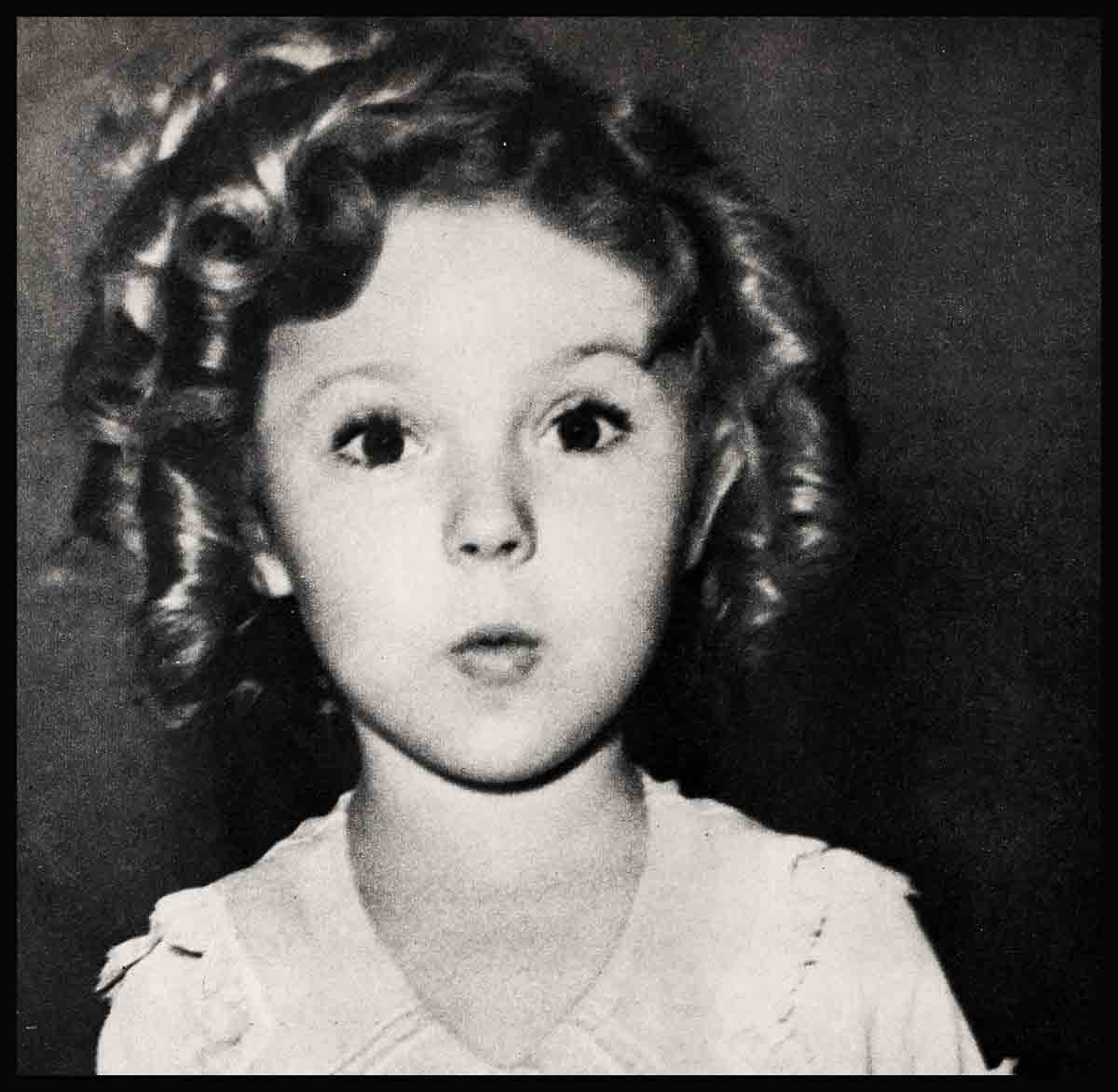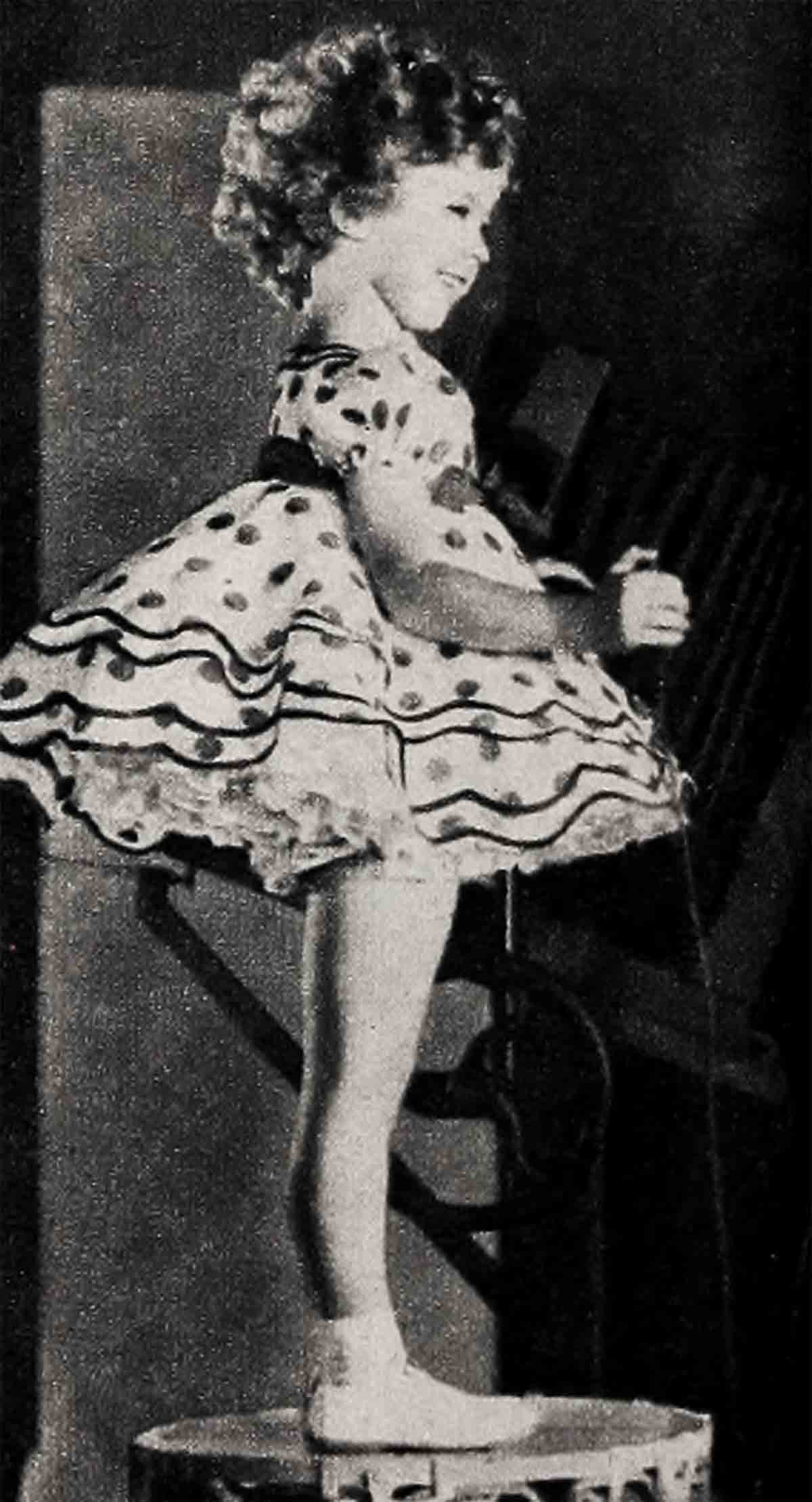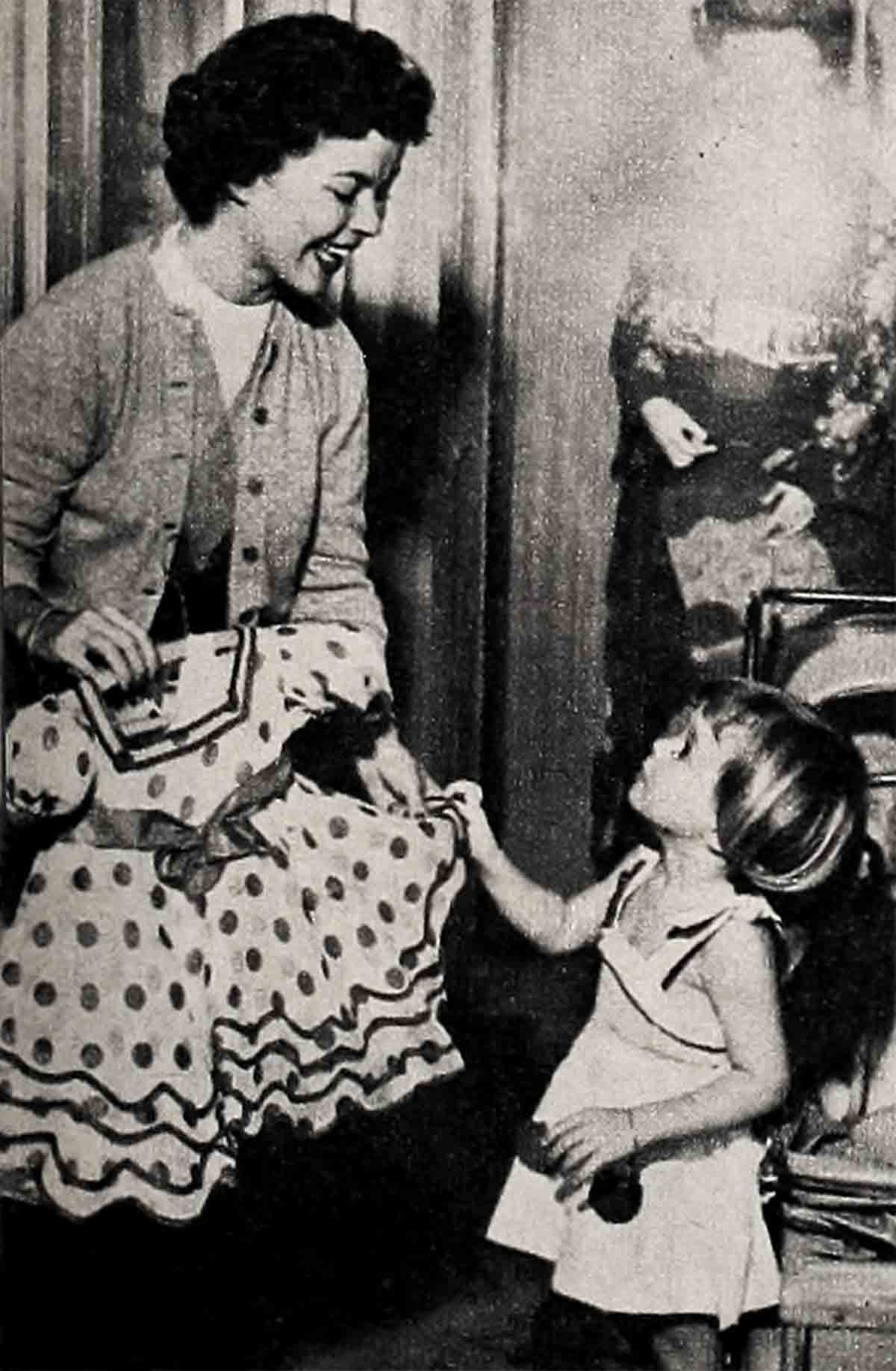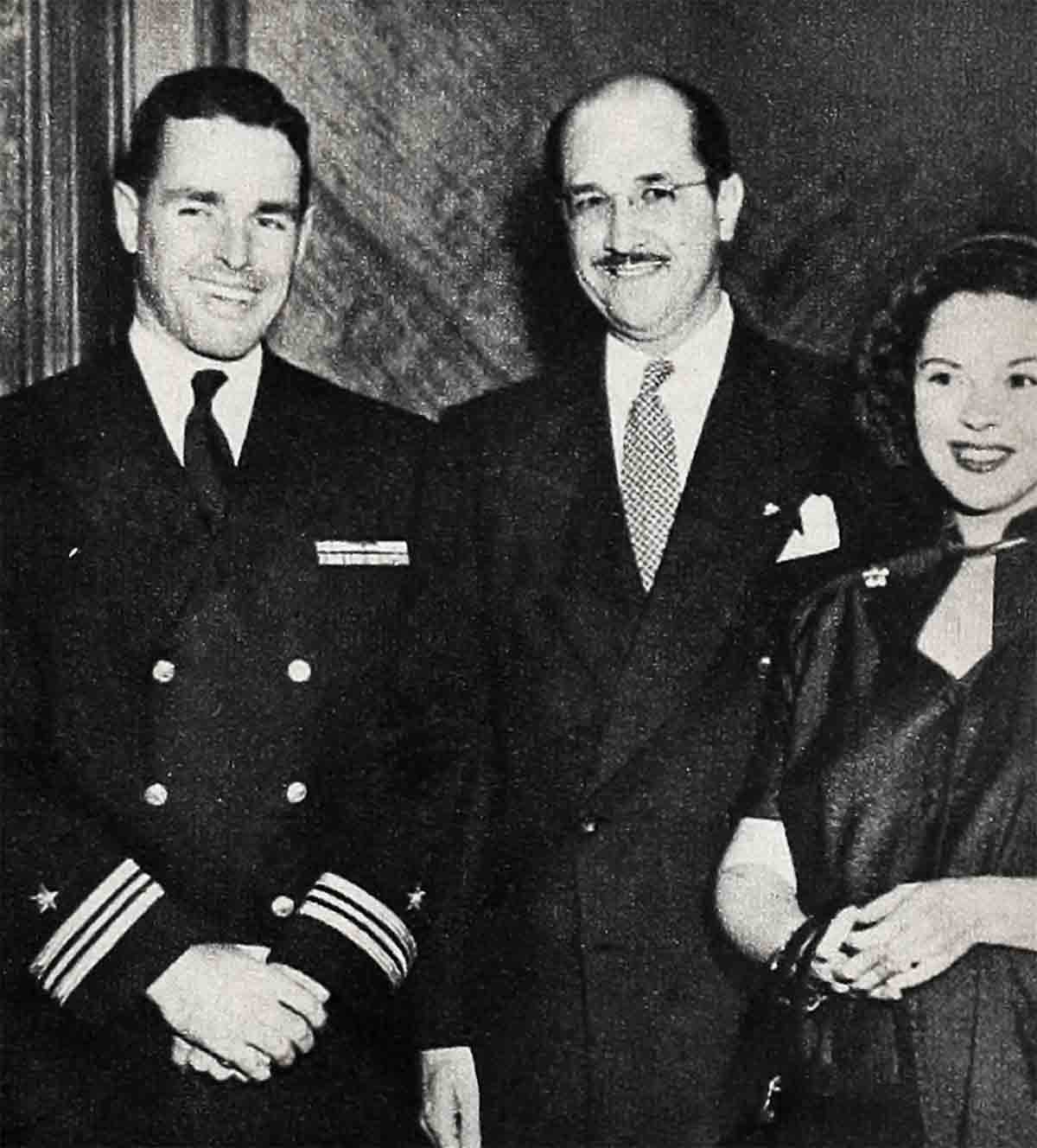
Shirley Temple Won’t Come Back!
There’s no Shirley Temple any more. In Bethesda, Maryland, just outside of Washington, D. C., there’s a Shirley T. Black, the wife of Lieutenant Commander Charles A. Black.
But this summer, when Mrs. Black was lying ill in the Bethesda Naval Hospital after the birth of her baby son, Charles, Jr., it was Shirley Temple for whose fate the world trembled. Photoplay was swamped with telephone calls anxious about the condition of the young mother who lives on in the nation’s heart as the curly-haired irresistible little child she herself was not too many years ago. Yet, when the personal letter of re-assurance as to the state of her health came into Photoplay’s offices, it came from Mrs. Black.
However, Shirley T. Black doesn’t look remotely like Shirley Temple. Not many days before Shirley gave birth to Charles, Jr., six high school girls presented themselves at the Blacks’ front door, assigned to do a story about Shirley Temple for their school paper. They looked at Shirley Black askance when, leaving the breakfast dishes she had been washing, she answered their ring. “You couldn’t,” they said in unison, “be Shirley Temple!”
“I was quite disillusioning to them,” she says with a giggle. “. . . a housewife and former movie star doing her own housework.”
With one hand she brushed her jet black hair—which she wears in a pony tail with a ribbon tied over a rubber band—back from her face. “This, too, of course puts people off. Actually when I let my hair go natural I had no idea it would be so dark . . . I hoped for light brown.”

Another time a tourist, taking pictures of the Black’s little house, was furious when a girl wearing blue jeans and a sweat shirt and working a tractor on the front yard, got in his way. “Move on, girl, move on,” he said irately. “We want a picture of Shirley Temple’s house—not a picture of you.
“When word got around that we had bought this place, quite a few tourists came by to take pictures,” Shirley says. “It was a sight too, Hedda, when we first took over! The front lawn—which we didn’t even call a lawn—was filled with weeds three feet high. I thought they were pretty. So I gathered a lot of them and filled vases. Immediately Charles and I started sneezing—and came down with hay fever. Too late I read a warning in the paper not to pick ragweed and not to bring it into the house.
“So I borrowed our neighbor’s tractor ind went to work. . . .
“That was last Labor Day. A few days later I learned I was going to have a baby.”
Shirley, awaiting her baby son, Charles, the day I visited her, was wearing a silk coolie coat and full trousers of dark blue. On her feet were lavender slippers. I asked her about the lack of stockings. “Well,” she said, “I would have to wear so much to hold them up. . . . It’s easier this way.”
“What will happen when the baby arrives?” I wanted to know.
“I’ve arranged for Susan to stay with our next door neighbor,” she explained. “Charles will take care of the house himself. And I’ll bring a nurse home from the hospital to look after the baby until I’m able to carry on alone.”

That morning Shirley had driven to the hospital in her car, with little Linda Sue—Shirley calls her Susan—beside her. The hospital doctor had told her he didn’t think she should drive a car any more.
“How else could I get here?” she asked him.
She is, obviously—despite her fortune which amounts to around three million dollars—having a wonderful time living as the wife of a naval officer, on a naval officer’s pay.
She does her housework and her cooking and she is companion and nurse to her four-year-old daughter. What is more, Charles Black, she says—she talks about him and how wonderful he is all the time—adores her cooking.
“Does he really adore it—or does he just say so?” I asked.
“He adores it! You know I went to cooking school, Hedda.”
“I should think,” I said, remembering the luxury of her Hollywood life, “that you would feel tied down—with a house and child to look after without full-time help.
“And whatever do you do about parties?”
Again that delightful giggle. “When I feel like going out—like having an afternoon of bridge with navy wives, say—I get a baby sitter.
“We don’t give big parties. In this house how could we? Whenever we entertain we get a mess boy from the Country Club. He makes the drinks and hors d’oeuvres. He serves beautifully. And I shop in the supermarket a few miles down the road.

“There’s no problem at all.
“And I’m so happy, Hedda. I love what I’m doing. I have never been so happy before.”
What Shirley has done, of course, is reverse her way of life. And her appearance and her relaxed manner as well as her words make it clear that this is the life for her.
“Do most of the navy wives do their own work?” I asked her.
“No, most of them have maids. But I enjoy getting along on my own.”
For years—all her life almost—she was treated like a little princess, guarded wherever she went, surrounded by crowds, forever dressed up and on parade, with everything done for her. Now she takes satisfaction in doing everything for herself, in living simply, in being free.
She’s old enough to know what she wants, even if she isn’t as old as she thinks. When we spoke of her approaching twenty-fourth birthday, she said, “Isn’t in horrible? I’ve lived almost a quarter of a century. I feel so old!”
At that remark I—who have passed the half century mark long since—started to creak in every joint, could scarcely get out of my chair for a tour of her house that sits, spic and span white, in two and one-half acres of ground. You could put the entire house into the luxurious living-room of her stone house in Brentwood. Her present living-room, about fourteen feet by fourteen feet, and a small den have fireplaces back to back. The dining room and kitchen are tiny. And there are three small bedrooms, two baths and also a half bath, half the size of one of Shirley’s old closets.

She had some of her smaller pieces and her best wedding presents sent on from California. Most of the silver, however, she stores on the top shelves of her cupboard. “I just don’t have time,” she explained, “to shine it.”
Susan’s bassinette and nursery equipment was sent on, too—so the sunny room, in readiness for the baby and the nurse, had everything. All I could think, looking at it, was that when the baby and nurse moved in it was going to be mighty crowded indeed. Shirley’s Great Dane, almost as tall as she, knew better than to try to accommodate his size to that space. He paused and waited at the door.
Shirley and Charles Black share a double bed. And it’s just as well they prefer this to twin beds. For were there twin beds in their room there would be no room for the hair dryer that occupies one corner—mute testimony that Shirley does her own hair—or the big California sun lamp that stands at the bedside.
In Susan’s room, they’ve built shelves to the ceiling, but these do not nearly accommodate her toys, which spill over the floor.
Shirley’s association with Susan is beautiful. Susan waked up from her nap when we inspected her room so I asked her how she liked living in Maryland.
“It is very nice,’ she said, “but I do miss the flower trees in California.”
“What does she mean by that?” I asked.
“The hibiscus,” Shirley explained. “At Palm Springs we had many hibiscus. And Susan used to go out in her birthday suit and gather the flowers from the bushes and from the ground.”
Susan giggled—and sounded just like Shirley!
Shirley said, “Now Darling, you finish your nap.” And like an angel, Susan settled down and closed her eyes. I thought of what my granddaughter would do under the same circumstances.
It’s fox hunting country where Shirley lives and, as she pointed out, there are many large and beautiful estates about.
“Of course,” she said, “we do not know the people who live in them. And we do not have a horse. . .

“That little building in the back that looks like a barn was meant, by the man who built this house, as a stable. But you can’t keep horses that close to the main road. So after the baby comes Charles and I are going to turn it into a guest house. . . .”
Her hardest job is learning protocol.
“The other day,” she said, “a retired Admiral and his wife left their calling ecard. So, quickly, I got out the book to see what I should do. I haven’t had any cards engraved yet, didn’t think I would need them until after the baby. It was with a sigh of relief that I learned you do not have to return cards an Admiral is retired.”
I told her about a friend of mine who, when her husband was made Secretary of Commerce, ordered calling cards by the pound. Three months after her husband became Secretary there was a change of Administration. He lost his job. And my friend wondered what on earth to do with all the cards.
Shirley roared. “I’ll never have that trouble. I’m very frugal about some things. And this is going to be one of them. . . .”
There was a knock on the back door. “Come with me,” Shirley said, “so man traveling salesmen find their way here that I keep the screen doors locked.”
The bread man was at the door.
“Give me one loaf of Hollywood bread, please,” Shirley said.
Outside, slim young dogwood trees were in bloom.
“It will be easy to sell this house,” she said, as we walked into the garden. It’s so small and compact. And houses in and around Washington are so difficult to find.”
I asked about pictures.
“Eric Johnston is good enough to invite us to his showings,” she told me. “And we go when we can get a baby sitter. . . .”
“Don’t you ever miss Hollywood, Shirley?” I asked. She shook her head. “Won’t you ever return to pictures?”
“Never,” she answered, “is such a final word and I have said it so many times that I just am not going to say it any more!” She looked very young and very serious. “But I do not think that I ever will. That is a life that was very good to me. But it is behind me. This is the life I love.”
And there were her lovely hazel eyes, soft and shining, to bear out the truth of her words.
Less than ten days after I visited Shirley, her baby son was born in the Bethesda Naval Hospital in Bethesda, Maryland, and things didn’t go nearly as smoothly as had Shirley’s plans.
The doctor decided to perform a Caesarean operation, although Susan’s birth was a natural one. The baby was wonderful; weighed eight and a half pounds. And Shirley was all right for six days; then everything went wrong. A blood clot developed. She had to have two transfusions. The doctor who brought Susan into the world was flown in for consultation. Her parents also went back. She was in the hospital six weeks, and instead of having a lot of visitors as she had expected, she was permitted none. Even Susan could be brought in only occasionally.
Shirley was weak as a cat and all her fine-laid plans for taking care of the baby as well as Susan and her husband, went right out the window.
When I phoned her in the hospital, I asked if this would prevent her from having any more children. She said, “Not at all. But it has slowed me up a bit.”
And there you have a picture of Shirley Temple Black, the wife of Lt. Com. Charles Black—housewife and mother, former movie star.
THE END
—BY HEDDA HOPPER
It is a quote. PHOTOPLAY MAGAZINE SEPTEMBER 1952




